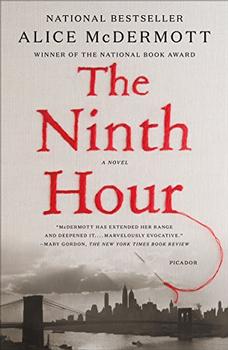Summary | Excerpt | Reading Guide | Discuss | Reviews | Beyond the Book | Readalikes | Genres & Themes | Author Bio

A Novel
by Alice McDermott
The apartment was crowded with people, perhaps every tenant in the place. The smell of smoke and wet ash, burned wool, burned hair, was part and parcel of the thick pools of candlelight in the room, and of the heavy drone of whispered conversation. There were two groups: one was gathered around a middle-aged man in shirtsleeves and carpet slippers who was sitting in a chair by the window, his face in his hands. The other, across the room, hovered beside a woman stretched out on a dark couch, under a fringed lamp that was not lit. She had a cloth applied to her head, but she seemed to be speaking sensibly to the thin young man who leaned over her. When she saw the nun, the woman raised a limp hand and said, "She's in the bedroom, Sister." Her arm from wrist to elbow was glistening with a shiny salve—butter, perhaps.
"You might leave off with that grease," Sister said. "Unless you're determined to be basted." The young man turned at this, laughing. He wore a gray fedora and had a milk tooth in his grin. "Have the courtesy to doff your hat," she told him.
It was Sister St. Saviour's vocation to enter the homes of strangers, mostly the sick and the elderly, to breeze into their apartments and to sail comfortably through their rooms, to open their linen closets or china cabinets or bureau drawers—to peer into their toilets or the soiled handkerchiefs clutched in their hands—but the frequency with which she inserted herself into the homes of strangers had not diminished over the years, her initial impulse to stand back, to shade her eyes. She dipped her head as she passed through the parlor, into a narrow corridor, but she saw enough to conclude that a Jewish woman lived here—the woman on the couch, she was certain, a Jewish woman, she only guessed, because of the fringed lampshade, the upright piano against the far wall, the dark oil paintings in the narrow hallway that seemed to depict two ordinary peasants, not saints. A place unprepared for visitors, arrested, as things so often were by crisis and tragedy, in the midst of what should have been a private hour. She saw as she passed by that there was a plate on the small table in the tiny kitchen, that it contained a half piece of bread, well bitten and stained with a dark gravy. A glass of tea on the edge of a folded newspaper.
In the candlelit bedroom, where two more policemen were conferring in the far corner, there were black stockings hung over the back of a chair, a mess of hairbrushes and handkerchiefs on the low dresser, a gray corset on the threadbare carpet at the foot of the bed. There was a girl on the bed, sideways, her dark skirt spread around her, as if she had fallen there from some height. Her back was to the room and her face to the wall. Another woman leaned over her, a hand on the girl's shoulder.
The policemen nodded to see the nun, and the shorter one took off his cap as he moved toward her. He, too, was singed about the cuffs. He had a heavy face, stale breath, and bad dentures, but there was compassion in the way he gestured with his short arms toward the girl on the bed, toward the ceiling and the upstairs apartment where the fire had been, a compassion that seemed to weigh down his limbs. Softhearted, Sister thought, one of us. The girl, he said, had come in from her shopping and found the door to her place blocked from the inside. She went to her neighbors, the man next door and the woman who lived here. They helped her push the door open, and then the man lit a match to hold against the darkness. There was an explosion. Luckily, the policeman said, he himself was just at the corner and was able to put the fire out while neighbors carried the three of them down here. Inside, in the bedroom, he found a young man on the bed. Asphyxiated. The girl's husband.
Sister St. Saviour drew in her breath, blessed herself. "He fell asleep, poor man," she said softly. "The pilot light must have gone out."
Excerpted from The Ninth Hour by Alice McDermott. Copyright © 2017 by Alice McDermott. Excerpted by permission of Farrar, Straus & Giroux. All rights reserved. No part of this excerpt may be reproduced or reprinted without permission in writing from the publisher.




When a true genius appears in the world, you may know him by this sign...
Click Here to find out who said this, as well as discovering other famous literary quotes!
Your guide toexceptional books
BookBrowse seeks out and recommends the best in contemporary fiction and nonfiction—books that not only engage and entertain but also deepen our understanding of ourselves and the world around us.